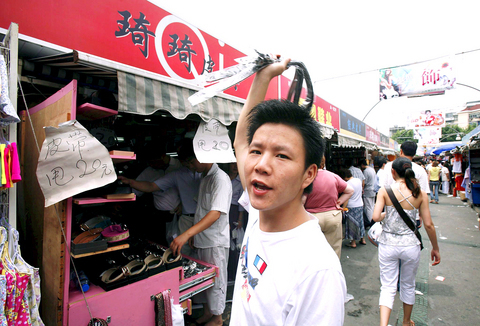Shanghai began closing down its downtown Xiangyang market yesterday, an open-air bazaar famous for cheap-priced counterfeit brand goods, and a symbol of the Chinese city's failure to crackdown on piracy.
As shoppers, both foreign and local, crowded in looking for last-minute bargains, peddlers were busy handing out name cards for new locations, mostly in 10 other markets that will not be affected by Xiangyang's closure.
"This market is full of fake goods, the atmosphere of piracy, has given Shanghai a very bad image," Xu Zhanglin, an official with the city's Intellectual Property Rights Bureau told the local newspaper Oriental Morning Post.

PHOTO: EPA
But Xu noted that the market brought in nearly 30 million yuan (US$3.7 million) in tax revenues a year.
Early yesterday, helmeted market inspectors gathered at the market and began removing items from stalls, beginning with a mall at the front of the market.
Xiangyang, named after a nearby street, is being closed to make way for a subway station and shopping complex, although city officials have touted the move as a blow against rampant piracy of brand-name items.
Image
"Personally, I think the city government wants to build a better image because of people's perceptions internationally," said Jack Chang, chairman of the Quality Brands Protection Committee, a group set up by foreign companies to work against piracy.
Despite occasional high-profile raids, sales of counterfeit products are widely tolerated in China.
Shanghai's tour guides made Xiangyang, set up six years earlier when shopkeepers were moved from another area earmarked for demolition, a regular stop on their itineraries.
Dozens if not hundreds of touts loiter around the market, shoving catalogues of fake luxury brand handbags and watches into the faces of passers-by in the hope of luring them into nearby back-alley shops set up to evade periodic market crackdowns.
Many of the peddlers said that they would keep those shops open, despite the closure of the market.
In the market's final days even more hawkers than usual crowded into the area, hauling fake DVDs in suitcases and taking over the sidewalks with displays of cheap jewelry and hair ornaments.
Discounts
"Entire shop special discounts!" said signs posted on virtually every market stall. Normally low prices dropped still lower, with fake Ralph Lauren polo shirts selling for an average 30 yuan and Pokemon game cards for 25 yuan.
Most, if not all, of the products being sold were flawed merchandise, some of the shopkeepers said.

In his National Day Rally speech on Sunday, Singaporean Prime Minister Lawrence Wong (黃循財) quoted the Taiwanese song One Small Umbrella (一支小雨傘) to describe his nation’s situation. Wong’s use of such a song shows Singapore’s familiarity with Taiwan’s culture and is a perfect reflection of exchanges between the two nations, Representative to Singapore Tung Chen-yuan (童振源) said yesterday in a post on Facebook. Wong quoted the song, saying: “As the rain gets heavier, I will take care of you, and you,” in Mandarin, using it as a metaphor for Singaporeans coming together to face challenges. Other Singaporean politicians have also used Taiwanese songs

NORTHERN STRIKE: Taiwanese military personnel have been training ‘in strategic and tactical battle operations’ in Michigan, a former US diplomat said More than 500 Taiwanese troops participated in this year’s Northern Strike military exercise held at Lake Michigan by the US, a Pentagon-run news outlet reported yesterday. The Michigan National Guard-sponsored drill involved 7,500 military personnel from 36 nations and territories around the world, the Stars and Stripes said. This year’s edition of Northern Strike, which concluded on Sunday, simulated a war in the Indo-Pacific region in a departure from its traditional European focus, it said. The change indicated a greater shift in the US armed forces’ attention to a potential conflict in Asia, it added. Citing a briefing by a Michigan National Guard senior

CHIPMAKING INVESTMENT: J.W. Kuo told legislators that Department of Investment Review approval would be needed were Washington to seek a TSMC board seat Minister of Economic Affairs J.W. Kuo (郭智輝) yesterday said he received information about a possible US government investment in Taiwan Semiconductor Manufacturing Co (TSMC, 台積電) and an assessment of the possible effect on the firm requires further discussion. If the US were to invest in TSMC, the plan would need to be reviewed by the Department of Investment Review, Kuo told reporters ahead of a hearing of the legislature’s Economics Committee. Kuo’s remarks came after US Secretary of Commerce Howard Lutnick on Tuesday said that the US government is looking into the federal government taking equity stakes in computer chip manufacturers that

CLAMPING DOWN: At the preliminary stage on Jan. 1 next year, only core personnel of the military, the civil service and public schools would be subject to inspections Regular checks are to be conducted from next year to clamp down on military personnel, civil servants and public-school teachers with Chinese citizenship or Chinese household registration, the Mainland Affairs Council (MAC) said yesterday. Article 9-1 of the Act Governing Relations Between the People of the Taiwan Area and the Mainland Area (臺灣地區與大陸地區人民關係條例) stipulates that Taiwanese who obtain Chinese household registration or a Chinese passport would be deprived of their Taiwanese citizenship and lose their right to work in the military, public service or public schools, it said. To identify and prevent the illegal employment of holders of Chinese ID cards or